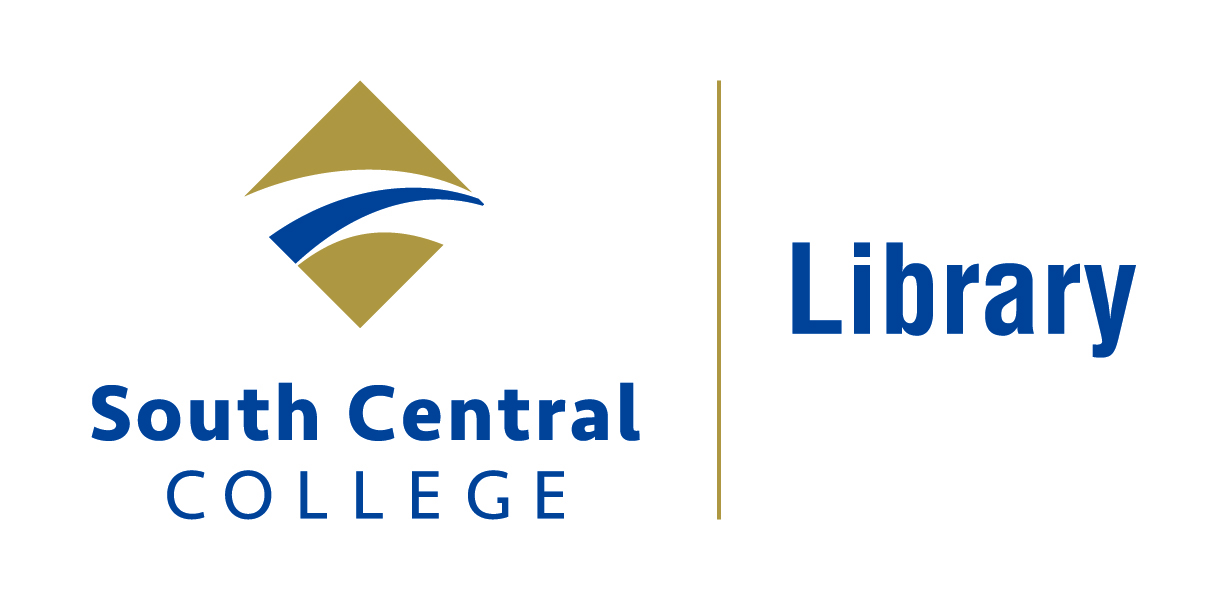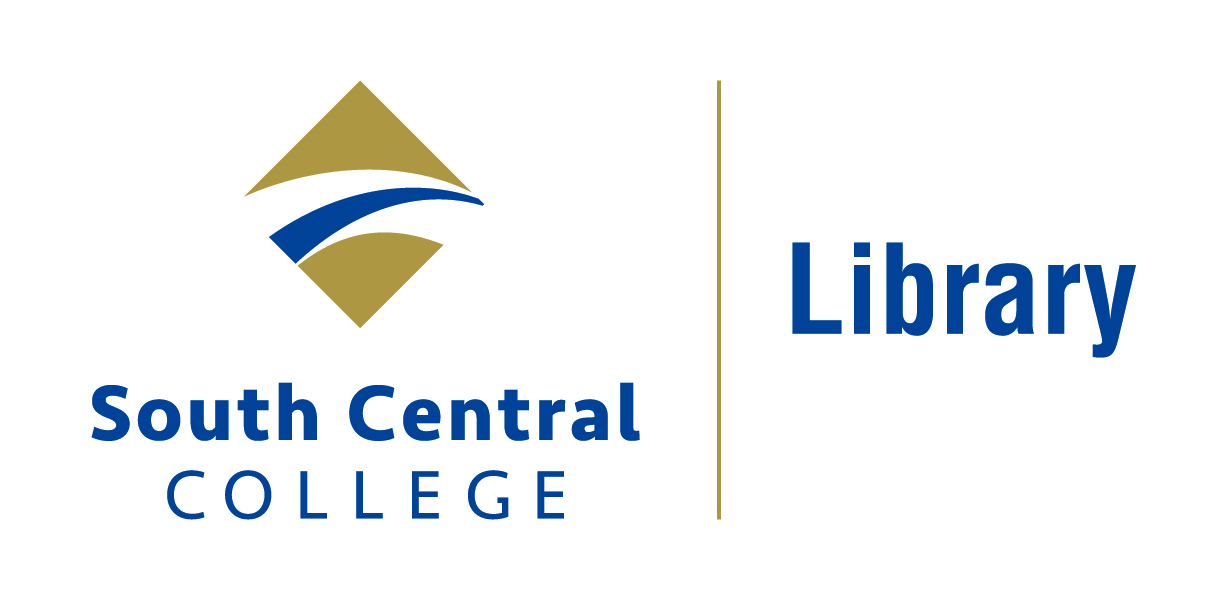Citing Your Sources
Writing Help at SCC Key SCC Library Resources Why Cite Citation Styles Plagarism & Copyright Practice South Central College Library ASK MN: 24/7 librarian chatTools and Resources
Style Guides Introduction to APA 7th Edition Tools and Resources for Citing Your Sources Evaluating informationSCC Library Catalog
Use your StarID to sign in to your account for best results, tools, and off-campus access
- SCC Catalog Home Page
Simple and advanced searching - Journal Finder
Find and browse e-journals in the SCC catalog
Resources
- Research Basics
When and how to begin at SCC Library - Using the Library Catalog
- Library Research Tutorial
Learn about information literacy, research, and critical thinking - FAQs
Brief answers to common questions - Guides
Research guides created for SCC programs and topics - A-Z Resources
Links to library databases, organizations, government agencies, digitial collections, and more
When you research a topic you may use information from articles, books, or the Web to support your ideas. However, you must credit the original authors of these sources by citing them. To cite means that you state where you found the information so that others can find the exact item again. In this way, we build upon the ideas and knowledge of other people.
Tips for researching and citing:
- Take clear, accurate notes about where you found specific ideas.
- Write down the complete citation information for each item you use.
- Use quotation marks when directly stating another person's words.
- Always credit original authors for their information and ideas.
Parts of a Citation
As you do your research, keep a list of your sources -- books, periodicals, and the Web. Below is the type of information you need to write down for a citation with each of its important parts labeled. Remember, too, that the Library Catalog and the article databases you access through the Library will create a citation for you.
There are a number of different styles or formats for citations. Which style you use depends upon the subject discipline you are working in. If you are uncertain about which style to use, ask your professor.
Each style includes the same basic parts of a citation but may organize them slightly differently. The most common citation styles used at SCC are:
MLA, Modern Language Association: The MLA style is often used by students in languages and English.
APA, American Psychological Association: The APA style is often used by students in the social sciences.
Use these online guides for help on citing a variety of sources:
OWL: MLA Guide
OWL: APA Guide
OWL: Chicago Manual of Style
(All OWL sites produced by the Online Writing Lab at Purdue University)
“MLA Style: List of Works Cited (8th Ed., 2016).” YouTube, 5 Apr. 2017, youtu.be/Qq5Itf5Tg-U. Accessed 20 Mar. 2023.
Reference List Basics. “Purdue OWL: APA Formatting: Reference List Basics.” YouTube, 10 Sept. 2012, youtu.be/HpAOi8-WUY4. Accessed 30 Mar. 2023.
Plagiarism is presenting the words or ideas of someone else as your own without proper acknowledgment of the source. If you don't credit the author, you are committing a type of theft called plagiarism. When you work on a research paper you will probably find supporting material for your paper from works by others. It's okay to use the ideas of other people, but you do need to correctly credit them.
Five Tips for Avoiding Plagiarism
1. First, use your own ideas. It should be your paper and your ideas that should be the focus.
2. Use the ideas of others sparingly -- only to support or reinforce your own argument.
3. When taking notes, include complete citation information for each item you use.
4. Use quotation marks when directly stating another person's words.
5. A good strategy is to take 30 minutes and write a short draft of your paper without using any notes. It will help you think through what you want to say and help prevent your being too dependent upon your sources.
It's against school policy to plagiarize. Don't let it affect your education! Here is the South Central College Academic Dishonesty Policy.
Copyright
Copyright ensures that the person who created something -- whether a book or a piece of music -- is reimbursed for his or her intellectual work. If there were no copyright protection, there would be no economic incentive to create these works. Look for this symbol to see if a work is copyrighted. ©
A copyright is a set of legal rights that an author has over his or her work for a limited period of time. Copyright covers everything from using images or sound files from the Web to photocopying.
Most information is protected by copyright. The exception is work that is in the "public domain," which can be reproduced or used by anyone. However, you must still credit the author. Some examples of public domain sources:
MLA Drag and Drop Citation Exercise
APA Drag and Drop Citation Exercise

Contact us at library@southcentral.edu
Phone:
North Mankato Campus Library: 507-389-7245
Faribault Campus Library: 507-332-5814
Spring Hours 2026
North Mankato and Faribault Libraries
- Mon-Fri: 8:00 am - 4:00 pm
- Sat - Sun: Closed
Library Staff Tools
Use AskMN live, 24/7 chat service with librarians across the country, and answers most research questions. Average wait time is 1-2 minutes, but during certain times of day, librarians can be very busy! Be informal, but courteous and respectful.
Citing Your Sources
Writing Help at SCC Key SCC Library Resources Why Cite Citation Styles Plagarism & Copyright Practice South Central College Library ASK MN: 24/7 librarian chatTools and Resources
Style Guides Introduction to APA 7th Edition Tools and Resources for Citing Your Sources Evaluating informationYou will find that there are different styles for citing the sources you use in your assignments. Your instructor will let you know whether to use APA, MLA, or some other style. Here are some introductory guides to these styles from the Purdue Online Writing Lab:
Our catalog and databases have built-in tools to provide citations for the books, videos, and articles you find in them. Just look for a link that says Cite or Citation, then choose the appropriate style.
- This content was originally created by Tacoma Community College Library and shared with a CC BY SA 4.0 license.
This free resource helps you generate an APA citation
Scribbr MLA
This free resource helps you generate an MLA citation
EasyBib
This resource allows you to generate an MLA citation from a variety of materials.
Citation Machine
Citation Machine helps you create citations in MLA, APA, Chicago, and Turabian formats. It also has a button called EssayCheck that will allow you to copy and paste your text in to have it checked/scored and get feedback.
APA Style (OWL)
APA In-Text Citation
The College of St. Scholastica in Duluth provides this comprehensive explanation of APA in-text citations, complete with examples.
MLA Style (OWL)
MLA Style Center
The MLA Style Center, published by the Modern Language Association, is the only authorized Web site about MLA style. This free, evolving resource is designed as a companion to the eighth edition of the MLA Handbook.
Have you ever heard of the CRAAP test? A librarian developed this handy acronym to help you remember these things when evaluating information.
Currency: is this the most up-to-date information on my topic?
Relevance: does this information relate to my topic?
Authority: is the author qualified to write about this subject?
Accuracy: has this information been fact-checked?
Purpose: is this information objective, or is it biased?
Here are some useful guides to help you evaluate the information you find on the web:
- CRAAP Detection: Criteria for Evaluating Information (Otis College of Art and Design)
- Evaluating Information (Johns Hopkins University)
- Evaluating Sources of Information (Purdue University)
- Evaluating Resources (UC Berkeley)


